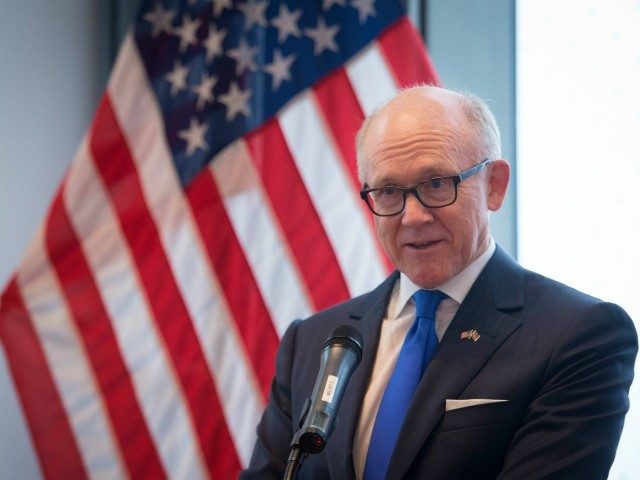U.S. Ambassador to the UK Woody Johnson has said that a “quick, very massive” American-British bilateral trade deal “doesn’t look like it would be possible” if MPs support Prime Minister Theresa May’s EU Withdrawal Agreement in the New Year.
Speaking on BBC Radio 4’s Today programme on Monday, Ambassador Johnson said that the deal President Donald Trump described as a “great deal for the EU,” would likely hinder a free trade agreement, saying, “It doesn’t look like it would be possible.”
Asked whether he though ministers and the prime minister understand what is at stake by tying the UK to the EU through the Withdrawal Agreement and prioritising a trade deal with the bloc, the American diplomat said, “I think they do understand, but there is a trade-off and… they are going to have to measure the impact of all the other trade deals and in terms of how important these kinds of new, important trade agreements would benefit the people and the country.”
Ambassador Johnson has raised before the possibility of Mrs May’s soft Brexit plans scuppering what U.S. officials hope will be “cutting edge” free trade agreement — although Ambassador Johnson maintained Monday that President Trump is still looking forward to doing a “quick, very massive bilateral trade deal” that would take the UK into “an exciting future.”
Trump’s Ambassador: Britain First in Line for ‘Ambitious’ Trade Deal… If You Manage to Leave the EU https://t.co/3qESgb5RIC
— Breitbart London (@BreitbartLondon) November 28, 2018
Telling BBC journalist Nick Robinson that he has been “very impressed” with the British people he has met whilst travelling the length and breadth of the UK, Ambassador Johnson expressed concern that the country lacked the leadership to deliver on the Brexit vote.
“I’m feeling the country’s in need of leadership,” he said.
“You can see the frustration in the Members of Parliament and them trying to navigate what the people wanted when they voted in the referendum.”
Reiterating his call for Britons to reject Brexit defeatism and embrace the possibilities of breaking free from the restraints of the EU, the ambassador observed “all of the reporting looks back. And it looks at a very static future rather than an active British future about solving problems, entrepreneurialism, taking advantage of opportunities, and being innovative.”
“What you’re leaving out is the great thing that Britain has to offer and that is all of the people… and their efforts and ability to solve problems and if you factor that in, I think the future’s extremely positive, extremely bright.”
Ambassador Johnson also debunked the myth that British anti-American sentiment is as widespread as the establishment media portrays. While travelling the country, the diplomat observed that “the mood is very much more pro-American than is reported — frequently — which doesn’t surprise me.”
“When I’m out talking to people — whether it’s fishermen in Peterborough or Ramsgate or in northern Scotland talking to the oil people — I just feel a positivity that is not well-represented in the media,” he added.
The warm feelings for the cousins across the pond appear to be mutual. A survey conducted on behalf of the Association of Marshall Scholars found that 91 per cent of Americans rated the ‘Special Relationship’ somewhat to very important, with more than half seeing the UK as the U.S.’s most strategic partner, and 63 per cent of U.S. citizens wanting an FTA after the UK leaves the EU.
U.S. Ambassador Warns Trade Deal with UK ‘Totally up in the Air’ After May’s Brexit Compromise https://t.co/kDvYDoaNlI
— Breitbart London (@BreitbartLondon) July 9, 2018

COMMENTS
Please let us know if you're having issues with commenting.